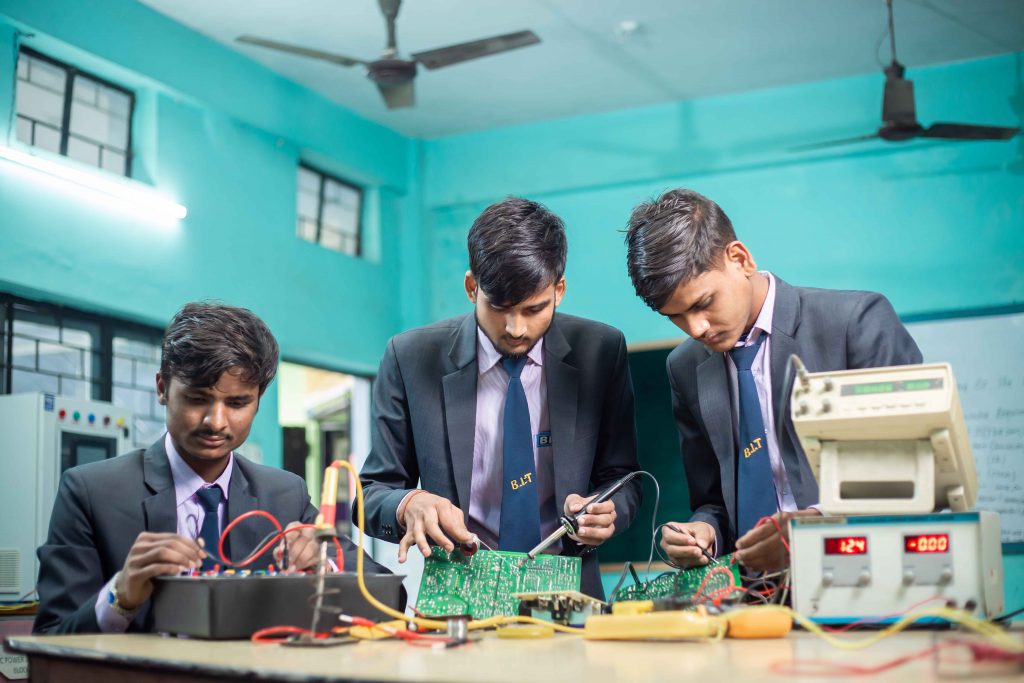- Home
- Diploma in Electronics Engineering
Diploma in Electrical & Electronics Engineering
- Last Updated : 30-11-2022
Electronic engineering is a field of engineering that deals with the design, development, and implementation of electronic systems and devices. It involves the study of various topics including analog and digital circuits, microprocessors, microcontrollers, communication systems, and signal processing. Electronic engineers use their knowledge of electronic theory and materials properties to design, develop and test electronic devices and systems. Applications of electronic engineering can be found in various industries, including telecommunications, consumer electronics, computer systems, aerospace, and defense.
The candidates can receive the application form from the administration office or authorized center by paying the fee structured by CTEVT.
- All Nepalese and foreign candidates must meet the entrance requirement of CTEVT.
- Domicile certificate or passport for foreign students(2 copies).
- Students from the general stream should be SEE/SLC passed or equivalence. TSLC students should have an aggregate mark of 66.66% from IOE and 68.33% from CTEVT.
Electronic engineers have a wide range of job opportunities in various industries. Some common job roles include:
Design Engineer – responsible for designing and developing electronic systems and devices.
Test Engineer – responsible for testing and verifying the functionality of electronic systems and devices.
Systems Engineer – responsible for the integration of electronic systems and ensuring they meet the required specifications.
Hardware Engineer – responsible for the design and development of electronic hardware components.
Software Engineer – responsible for the design and development of software for electronic devices and systems.
Network Engineer – responsible for the design, implementation and maintenance of communication networks.
Get Admission
- Duration: 3 Years
- Category: Electronics/Electrical
- Language: English
- Affiliation: CTEVT
Why Choose
Diploma in Electrical & Electronics Engineering?

Electronics Engineering is a field you commonly correlate to mobile gadgets, desktops, and other electronic solutions that help us in the modern world. Yet, without going into detail, you cannot understand what stays behind the creation of the devices, since you just enjoy their functionality.
If you crave studying electronics, you used to create some amateur machines, and have a desire to change the world with your own creations, electronics engineering might be a good fit. This guide will uncover the key information about this discipline, and share some tips on what you can do with it in terms of career prospects.
- Extensive Career Opportunity
- A Global & Lucrative Profession
- Have a wealth of job options
- Learn valuable transferable skills
Diploma in Electrical & Electronic Engineering
Course Structure
| Subject code | Subjects | Credit Hour | Full Marks |
|---|---|---|---|
| 1 | Applied Nepali | ||
| 2 | Applied English | ||
| 3 | Engineering Mathematics I | ||
| 4 | Engineering Physics I | ||
| 5 | Engineering Chemistry I | ||
| 6 | Engineering Drawing l | ||
| 7 | Computer Application |
| Subject code | Subjects | Credit Hour | Full Marks |
|---|---|---|---|
| 1 | Engineering Mathematics II | ||
| 2 | Engineering Physics II | ||
| 3 | Engineering Chemistry II | ||
| 4 | Workshop Practice I | ||
| 5 | Engineering Drawing II | ||
| 6 | Applied Mechanics |
| Subject code | Subjects | Credit Hour | Full Marks |
|---|---|---|---|
| 1 | Fundamentals of Electrical Engineering | ||
| 2 | Computer Programming | ||
| 3 | Basic Electronics | ||
| 4 | Electrical Engineering Material | ||
| 5 | Electrical Installation I | ||
| 6 | Computer Aided Drawing | ||
| 7 | Electrical and Electronics Engineering Drawing | ||
| 8 | Digital logic |
| Subject code | Subjects | Credit Hour | Full Marks |
|---|---|---|---|
| 1 | Microprocessors | ||
| 2 | Electric Circuit Analysis | ||
| 3 | Electronics Devices and Circuits | ||
| 4 | Basic Programmable Logic Control (PLC) | ||
| 5 | Electrical Machines I | ||
| 6 | Electrical Instruments and Measurements | ||
| 7 | Repair and Maintenance of Consumer Appliances I |
| Subject code | Subjects | Credit Hour | Full Marks |
|---|---|---|---|
| 1 | Switch Gear and Protection | ||
| 2 | Power Electronics | ||
| 3 | Electrical Machines II | ||
| 4 | Minor Project | ||
| 5 | Digital Electronics Circuit | ||
| 6 | Repair & Maintenance of Consumer Appliances II | ||
| 7 | Communication System I |
| Subject code | Subjects | Credit Hour | Full Marks |
|---|---|---|---|
| 1 | Communication System II | ||
| 2 | Design, Estimating & Costing of Electrical & Electronics Installation | ||
| 3 | Industry Based Major Project | ||
| 4 | Industrial Attachment | ||
| 5 | Entrepreneurship Development | ||
| 6 | Transmission and Distribution of Electrical Power | ||
| 7 | Elective (Any One) a) Hydro Power b) Broadcast Engineering c) Renewable Energy Technology d) Electrical Energy Management e)Internet/Intranet f)Satellite Communication |
The students who have passed Diploma level in Electrical Engineering and Electrical & Electronics Engineering will be able to understand the basic principles of electricity, operate machine and electrical circuits, conduct and maintain mini/micro hydropower station, repair household appliances, make supervision of domestic and industrial electrical work as well as the supervision of power transmission distribution.
The students will get an opportunity in various possible field such as Nepal Electricity Authority, Nepal Air Corporation, Radio Transmission Development Committee, Nepal Telecom Co., Industries, private workshop etc. They will be given opportunity in foreign employment and technical institution as well.
Er.Simran Patel
HoD, Electrical Engineering /Electrical & Electronics Engineering Department

Team
Faculty Members
- Er. Raghib Hussain - BE(Electronics)
- Er. Niraj Shriwastav - BE(Electronics & Communication)
- Er. Digambar Yadav - BE(Electronics & Communication)
- Er. Shubhash Mehra - BE(Electronics & Communication)
- Er. Ram Gulam Sah - BE(Electronics)
- Er. Sumit Kumar Sah - BE(Electronics & Communication)
- Er. Dhurendra Thakur - BE(Electronics & Communication)
- Er. Bibek Kumar Chaudhary - DE(Electronics)


